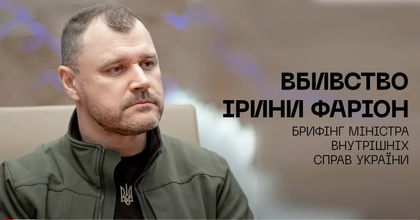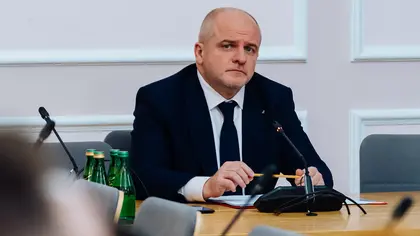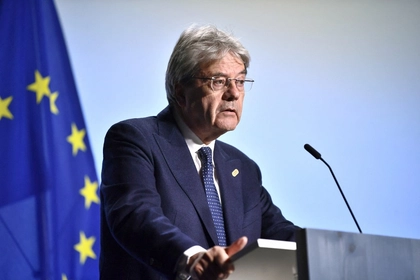You recently had the opportunity to visit Ukraine. What’s the current situation on the front line, based on your observations?
At the front line – which I’ve been visiting more or less semiannually for the past two years – I saw highly trained and well-equipped soldiers. The changes that have taken place in the Ukrainian army are plainly visible and frankly astounding. But the lack of ammunition remains a serious issue, one that Ukraine’s servicemen are acutely aware of. That’s something that needs to be articulated with greater force in the West. The Ukrainians are mobilized, they’ve reformed their army, and their logistics are robust – all of which has made a big impression on observers from around the world.
How would you describe the mood among the Ukrainian public right now? Some people I’ve talked to have described it as far from optimistic.
War always arouses emotions, and emotions are volatile by their very nature. The mood has changed in the past two years. Much of the enthusiasm is definitely gone. People have gotten used to war, which is a natural and, paradoxically, beneficial psychological process. On the other hand, I don’t see any dejection or willingness to sign an unfavorable peace deal. Ukrainian society has made enormous sacrifices, and the war has cost the country many lives. Over 60 percent of Ukrainians say they’ve lost a loved one, are mourning someone’s death, or are separated from someone close to them. That’s also something that stokes the Ukrainians’ will to fight.

Farion’s Killer Prepared Disguises, Had Another Victim in His Sights, Interior Minister Says
Why do you say it’s good for people to grow accustomed to war?
Because it’s a way to avoid living in a constant state of trauma. God – or nature, if you prefer – gave us the innate ability to adapt to war and bear the mental burden that comes with it. On the other hand, we need to feel motivated in order to fight. It’s a struggle between two elements. But it’s not the Ukrainians who need to be motivated – it’s the West.
You mentioned that the West needs to supply ammunition to Ukraine. Is the West as motivated and united on this issue as it once was? We’re seeing the formation of an ammunition coalition spearheaded by the Czech Republic, along with bold statements by French President Emmanuel Macron, but on the other hand we’ve seen the policies pursued by Hungary and Slovakia and the political gridlock in the United States. We’ve heard plenty of declarations of support, but is there any follow-through?
There’s no question that Ukraine isn’t getting as much ammunition as it needs. Ideally, the West should provide several million units. The Czech president’s initiative is brilliant and will soon show results. The European Union will also provide ammunition – not the one million units it promised, but a few hundred thousand. Individual countries are already ramping up production, which makes the overall outlook more optimistic than pessimistic, all things considered. What matters now is that we win the race against time. We have to act fast in order not to waste the efforts of the Ukrainian military, and the coming weeks will be decisive. I believe we’ll also overcome the intransigence of the US Congress in this period. Congressional support is vital, not least because the countries of Central and Eastern Europe put great confidence in American promises.
“I think the use of the word ‘conflict,’ is exaggerated and distorts the true state of Polish-Ukrainian relations.”
At the start of the invasion, Poland supplied Ukraine with crucial military aid and welcomed millions of refugees. Recently, however, we’ve witnessed conflicts between the two countries over a number of issues, including grain. The recent change of government in Warsaw did little to resolve these differences. What is your view of Polish-Ukrainian relations right now, and what challenges do they face?
I wouldn’t go so far as to call it a conflict; that’s a term used by commentators and the media. There’s nothing particularly extraordinary about the farmers’ protests in Poland. Similar protests have taken place across the European Union for as long as I can remember. The truth of the matter is that grain prices have fallen and we have a production surplus in Poland. Meanwhile, the European Union has been flooded by grain from South America, Ukraine, and – unfortunately – Russia, forcing us to take measures to protect certain areas of agricultural production. But that’s an issue between Poland and the European Commission.
I think the use of the word “conflict,” which you cited in your question, is exaggerated and distorts the true state of Polish-Ukrainian relations. You mentioned the enormous support Poland has shown Ukrainians, including welcoming millions of women and children, who enjoy a full range of benefits in Poland, and who also benefit the Polish economy – a fact that also bears mentioning – while strengthening the bonds between Poland and Ukraine. Then there’s the vast quantity of goods Poland exports to Ukraine. That’s the reality of Polish-Ukrainian relations.
There is a fly in the ointment, however, and that’s the issue of agricultural products, but upon closer examination, it’s apparent that the problem is largely between Poland and the European Commission, and has much less to do with Ukraine itself.
And yet many Ukrainians feel sore about the matter. The social capital that accrued between Poles and Ukrainians has eroded.
Public opinion is based on emotions, and emotions are subject to change. But international relations can’t be based on emotions, which is why I think they should be formalized in legal documents. Poland co-signed the recent joint statement by the G7. We’re working on a number of agreements, one of which pertains to defense cooperation. As far as public opinion goes, it’s clearly different than it was two years ago, but I would venture a different question here: Is there any nation in Europe today that shares a closer bond with Ukrainians and supports them more than Poland? Poland and the Baltic states are the only countries in which the government and public opinion are firmly on the side of Ukraine and oppose Putin.
Since you’ve mentioned legal documents: About two years ago you wrote an article with Jan Krzysztof Bielecki in which you argued for a treaty between Poland and Ukraine. As a professor of history, you cite the examples of Symon Petliura and Józef Piłsudski, the Quirinal Treaty, and other precedents. A joint session of the Polish and Ukrainian governments is scheduled to take place in Warsaw later this month. What should this treaty contain and is it still on the table?
Drafting a comprehensive treaty takes several years and requires the involvement of both parties. I think we’ll start by focusing on solutions for individual sectors. Under the current circumstances, defense seems a natural choice. As I said, ammunition and defense cooperation is crucial. Poland is Ukraine’s largest [EU] neighbor, and our cooperation in this area should be especially close.
It’s also the 25th anniversary of Poland’s NATO accession. In addition to the celebrations and commemorations, we should take this opportunity to clearly articulate the need to bring Ukraine into the alliance’s fold. This will require Poland and Ukraine to find legal and diplomatic solutions, and should be discussed with our NATO allies before the July summit in Washington.
There’s more to Polish-Ukrainian relations than military matters. Local elections are coming up in Poland. There have been calls to grant Ukrainians the right to vote in them, which would be legal under EU law. Where do you stand on this issue?
I believe that the right to vote in elections is one that belongs to citizens, first and foremost. I think there are certain social processes that should not be rushed. There will come a time for that debate. It might be a good idea, but there are plenty of other issues right now that require our attention, and this discussion threatens to spark pointless arguments. In any case, with local elections coming in April, it’s too late for this discussion, and the next election won’t be held for another five years. The question just isn’t relevant at the moment.
Ukrainian refugees in Poland enjoy many rights and privileges, including social benefits. Parliament recently extended the duration of the Law on Assistance to Ukrainian Citizens. What future lies in store for Ukrainians in Poland?
It’s a mistake to think of them as privileges. Everyone who lives, works, and pays taxes in Poland has the same rights as every Pole and cannot be discriminated against. These are good policies. Poles want Ukrainians to feel welcome in Poland. Some of them will probably go back to Ukraine, while other will settle down here and start families.
Good social policy requires solutions that are beneficial to society as a whole. If we want Ukrainians to feel welcome in Poland, and if we want to avoid conflicts in society, then everyone who lives here should be guaranteed the same fundamental rights. The Law on Assistance to Ukrainian Citizens is amended every six months to reflect the current needs and circumstances, and subsequently extended.
Much has been said about the cultural proximity between Poles and Ukrainians, our shared history, and our mutual understanding. The facts are undeniable, but considering some of the arguments between our countries, is it accurate to say we understand one another? Studies show that our societies are drifting apart.
Historical issues play a major role in our relationship – there’s no question about it. As a historian, I understand their significance, but my academic perspective also allows me to approach them with a level head. Historical arguments have a way of resurfacing with renewed ferocity in the third generation.
Every war crime and every genocide must be condemned, and that is precisely the unambiguous position I expect from other politicians. I think this is the right moment to condemn, openly and calmly, every wrongdoing committed against civilians, every crime, every innocent death, and expect the bodies to be exhumed and given proper burials. It is up to Ukrainian historical institutions to reckon with the Volhynia massacres. I expect no less of similar institutions in Poland and other countries when it comes to crimes committed by their citizens.
If we seek to put an end to the slaughter of civilians once and for all, we must condemn these crimes. It’s the best vaccine we have. You could argue that it’s not enough, or you can see it as a powerful tool. It’s our responsibility to do so.
“History shows us that whenever there is war or calamity, there is always a window of opportunity for change.”
What role does historical politics play in Ukraine, and what form does it take?
Historical politics is always relevant, particularly now, when Ukraine is at war and building its historical myths. What I find surprising in these circumstances is how little attention is paid to building the myth of Azovstal and the defense of Mariupol. I’m sometimes baffled by the fact that these events aren’t at the center of Ukraine’s messaging, given how distinct, universal, and broadly relatable the story is. It evokes strong emotions all over the world, not just in Ukraine.
I find it disturbing that the UPA has become such a powerful legend. I think it’s detrimental to the formation of the modern Ukrainian nation, but as a Pole and a Polish politician, I have no say in the matter. I can’t force anyone in Ukraine to behave one way or another, but I’m also convinced that this cannot impact Polish-Ukrainian relations, at least when it comes to issues that are relevant today. Sometimes you have no choice but to acknowledge things you disagree with.
I’d like to conclude by asking about your outlook on the future of Polish-Ukrainian relations and the challenges facing our countries and societies.
We cannot afford to squander this historical moment we’re in. History shows us that whenever there is war or calamity, there is always a window of opportunity for change. I find it very concerning that, in Ukraine, relations with Poland are discussed through the lens of the protests and blockades on the border. What goes unmentioned is that these protests are largely targeted at policies enacted by the European Commission.
I’m also concerned that the narrative in Poland mirrors that of Ukraine, giving an image of Polish-Ukrainian relations that’s very far from accurate. If we continue to depict our relations in this light, everyone will grow accustomed to it, and what is currently a very good relationship could soon be considered very bad or problematic. Voices of calm and common sense tend to get drowned out in this discussion, but there’s still hope.
You can also highlight the text and press Ctrl + Enter






